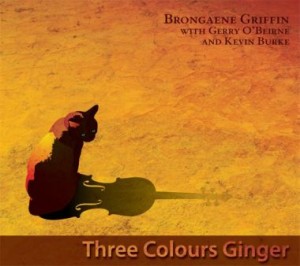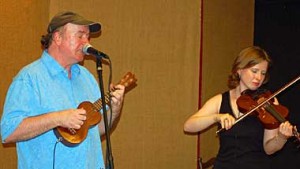 A sun-soaked illustration of a cat casting a long violin-shaped shadow adorns the cover of “Three Colours Ginger” by Oregon fiddler Brongaene (Bronnie) Griffin. Most of the sets of tunes on the CD bear a feline-derived title: “Black Cat,” “Calico,” “Copy Cat,” and “Tortoiseshelled Chesire.” Between the musical tracks, the superb Irish fiddler Kevin Burke recites such odes to kitties as “The Cat of Cats,” “The Cats of Kilkenny” and even “The Owl and the Pussycat,” delivered in a voice like honeyed whiskey.
A sun-soaked illustration of a cat casting a long violin-shaped shadow adorns the cover of “Three Colours Ginger” by Oregon fiddler Brongaene (Bronnie) Griffin. Most of the sets of tunes on the CD bear a feline-derived title: “Black Cat,” “Calico,” “Copy Cat,” and “Tortoiseshelled Chesire.” Between the musical tracks, the superb Irish fiddler Kevin Burke recites such odes to kitties as “The Cat of Cats,” “The Cats of Kilkenny” and even “The Owl and the Pussycat,” delivered in a voice like honeyed whiskey.
Whimsically themed this new recording may be, but it is also seriously good. It could hardly be otherwise. Griffin cut her teeth on old-timey tunes, at which she excelled from an early age, but she is no less a whiz on Irish fiddle. She took instruction from Burke (which should say something), and he himself appears on two tracks. The master guitarist, singer and song-writer Gerry O’Beirne produced the CD, and he plays guitar and ukulele throughout.
Some of the very best moments are those in which Griffin and O’Beirne play unaccompanied. (Check out track 3, ”In the Tap Room” and “The Foxhunter Reel;” track 5, a collection of slides, “Where’s the Cat,” “Behind the Bush in the Garden” and “The Cat Rambles to the Child’s Saucepan;” and the 10th track, “Margaret’s Waltz,” dedicated to Griffin’s sister.)
Of course, there’s a lot to like about the sets in which Griffin has plenty of company. And good company it is. Griffin is joined by some high-powered traditional talent of the Pacific Northwest, including harper Elizabeth Nicholson, fiddler Bob Soper, Jim Chapman on bouzouki, guitarist Nancy Conescu and Johnny B. Connolly on button accordion. (Burke also resides in Portland, which apparently is knee-deep in world-class traditional Irish musicians.)
I was especially fond of Nicholson’s bell-like handiwork on the opening track, Colorpointe (“The Cat in the Fiddle Case” and “The Fisher’s Hornpipe);” the second track, a set of jigs including “The Orphan” and “The Stray Away Child;” and track 8, another set of jigs fitted onto the tail-end (so to speak) of Burke’s recitation of “The Cats of Kilkenny.” Connolly and Chapman contribute a good deal of color and depth on the tracks on which they appear.
Which brings up a minor point. All of the musicians appear in more places than the credits would indicate. The best example of that little oversight is Griffin’s sixth track, O’Carolan’s “Planxty Hewlett,” a lush waltz that reminds me a little of “Ashokan Farewell,” and even Pachelbel’s Canon in D. None of the accompanists is credited on this piece.
The tune begins with a sure-handed Griffin and O’Beirne proceeding alone, but it builds in delicate, lacy layers—a second fiddle (could be Burke, could be Soper), then Connolly, and finally Nicholson. It’s my favorite number on the album, and it will bring to mind all the happy-sad moments of your life and leave you to dissolve into a puddle of weepiness. It’s a lovely, tender performance by Griffin.
There are a few other faults in the credits but, really, it’s what’s inside that counts. You’re going to pay rather more attention to Griffin, who plays with confidence, poise and deep expression. (And she’s a musician with a conscience. The cat theme stems from her work in animal welfare, and a portion of the proceeds from the sale of this CD will benefit the Feral Cat Coalition of Oregon and Indigo Rescue, which rehabilitates rescued animals before they’re placed in adoptive homes.)
You’ll be impressed by the ensemble work as well. The performance of Griffin and company seems less like a recording session than the spontaneous collaboration of a group of good friends at a traditional Irish music session.
And that might be the highest compliment you can pay to any recording of Irish traditional music.

